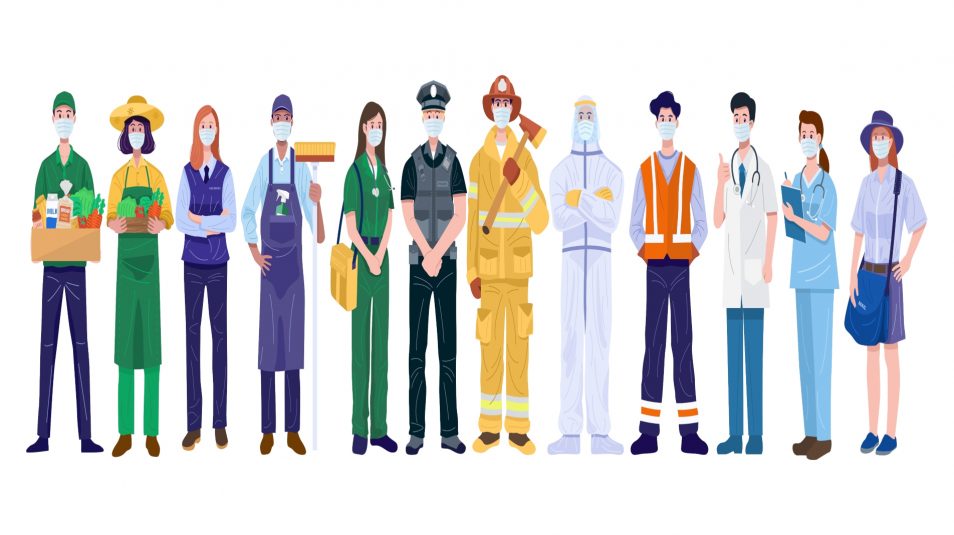No different than a filing cabinet

Leadership
February 9, 2021
Jane Perdue
Executive Director, The Jane Group
Topics
Appreciation, employee recognition, essential workers, Gratitude, pandemic, recognition, ValueNo different than a filing cabinet.
That’s how a colleague said her boss treated employees. Makes your heartache, doesn’t it? But sadly, from my experience and research, bosses treating employees that way isn’t uncommon. A Gallup poll shows that 58 percent of employees feel that their organizations don’t care about their well-being.
I have vivid memories of one boss in particular. He excelled at not “seeing” employees. In that office, there was a long, long hallway that stretched from the lobby down the entire length of the high-rise floor. The hallway was a thoroughfare—everyone, including the big boss, had to walk it to get their office or cube.
Every morning the big boss was in town, he’d exit the elevator, silently walk past the receptionist, and head down the hall. He walked past cubes, the break room, the copy room, offices with glass walls, and employees in the hall—and never acknowledged a soul.
He walked that hallway as if he were the only person on the floor. If he saw people, he didn’t let on. Smiles or nods weren’t returned. If he heard people, he didn’t let on. Greetings or questions were left hanging in the air.
What always amazed and annoyed me was how shocked and angry he was about the results of employee opinion surveys in which people said they felt unseen, unappreciated, and not valued.
The COVID-19 pandemic’s impact on work has resulted in many formerly “unseen” workers suddenly becoming essential. Those folks don’t get to work from home because grocery store shelves must be stocked. Deliveries made. Trucks unloaded. Floors swept. Food prepared. Wounds dressed. Shots administered. Goods made and serviced rendered. Jobs that were once “low-status,” “low-skills,” or “low prestige” are now of utmost importance.
Once Covid-19 is in everyone’s rearview mirror, I hope essential workers (as well as all non-executive employees) move up several notches in how they and their contributions are seen and valued. Covid has replaced certainty with fluidity. That fluidity presents us with an opportunity to reshape our thoughts, opinions, privilege, and perspectives. An opportunity to see with new eyes, feel with a more compassionate heart and evaluate with a new and different yardstick.
To facilitate that change of perspective, I’ve been noodling a few shifts in thinking. Here are the thoughts I’ve assembled so far.
1) Value jobs by meaning, not just a pay grade.
Early in the pandemic, I was horrified to encounter empty shelves and cases at my local grocery store. Imagine those shelves staying empty for weeks, maybe months. Imagine not receiving Amazon deliveries. Imagine not being able to get your cable outage fixed or ride the bus service. There’s considerable social value in the jobs we take for granted and compensate accordingly.
2) Replace taking people and things for granted and practice gratitude. Daily.
That boss of mine who blindly walked the long hallway took the contributions of his employees for granted. It never occurred to him that all work—no matter where on the pay scale the job fell—is work that gets done by and through people. If those “beneath” him didn’t do their work, he and his corner office job wouldn’t be needed.
3) Don’t settle for only words, look for action and follow-up if it doesn’t happen.
Today’s pace of life is like a storm swollen stream, fast and hard to control. So, we may hear those in charge speak the right words and promise change, and feel comforted that they’re doing something. However, if it’s only the words that happen and nothing else, we have to step up and hold people accountable for acting.
4) Remind ourselves to keep clapping, recognizing, and showing appreciation.
Early in the pandemic, recognition flowed daily to health care workers, first responders, and other essential workers. With the pandemic feeling like it’s everlasting, we have to keep the appreciation going. Maybe daily clapping is overkill, but periodic, authentic, heart-felt recognition is always welcome.
5) Connect so people don’t feel invisible.
Who likes feeling unseen? I know I don’t. Communicating can take lots of forms, some quick and others more intensive. We can make the time to engage in a two-way conversation, or we can acknowledge someone’s presence with a smile or nod. It’s a “just do it” kind of thing.
That’s all I’ve thought of so far. What actions for showing gratitude, appreciation, value, and recognition would you add to the list?






